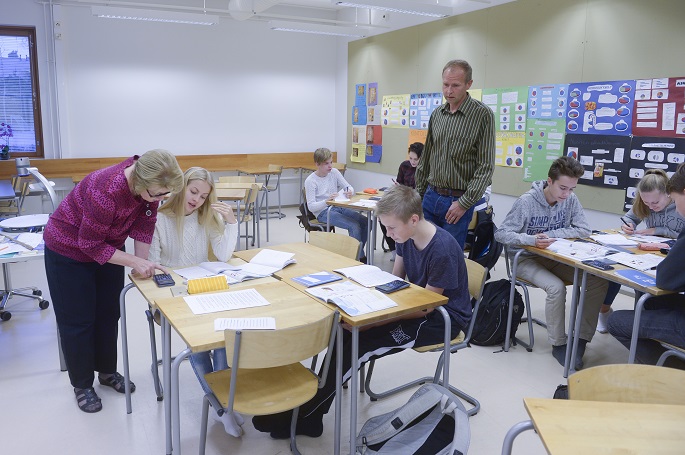Schools help children to know Ukraine crisis calmly
Published : 08 Mar 2022, 03:22
Early childhood education and care, schools and educational institutions can help children understand what has happened in Ukraine and approach the situation calmly, said the Finnish National Agency for Education in a press release.
The situation in Ukraine keeps changing rapidly, and not even adults can provide answers to all the questions that children and young people may have.
That being said, Children and young people should be reminded that the situation in Ukraine is exceptional and that life in Finland is safe.
“Our schools are well-prepared for different threats and hazards. One of the key tasks of schools during crises, including the one we are facing now, is to uphold everyday routines and ground children and young people in an ordinary and safe everyday life,” said the press release.
Terming the events like the Ukraine crisis as shocking to all, the agency said that the media reporting about the matter can confuse and frighten children and young people in particular.
Early childhood education and care, schools and educational institutions play a crucial role alongside homes in restoring the feeling of safety and security of children and young people.
Children and young people should also be protected from the flood of war news – events that are happening far away, but nevertheless shock everybody as well.
Children and young people’s reactions to events reported in the news are usually stronger the closer they feel that the events are to them.
Some children and young people may be severely concerned about the well-being of the people living in crisis areas. There are also children and young people at schools who have come to Finland from war-torn areas and students who will be starting their military service soon. When planning school procedures, it is important to take into account that the Ukraine crisis has different impacts on the everyday lives of children and young people living in different parts of Finland.
In Eastern Finland, the situation may also be challenging on account of the large numbers of both Russian and Ukrainian students studying there at different levels of education.
In large cities, there are also large numbers of students with immigrant backgrounds. As such, schools should also prepare for potential tension between pupils and students. But whatever their nationality or native language, no child or young person should be blamed for geopolitical conflicts.
Children and young people’s capacity to process a crisis and exposure to news about it varies by age. When the matter is discussed at school, it is therefore important to take the level of development of the children and young people into account.
The need to discuss the matter varies between individual children and young people, and nobody should be forced to process it. At the same time, sensitivity is required to recognise the situations in which pupils express their desire to discuss the matter. If necessary, the matter can also be discussed in the contexts of multiple school subjects.
The younger the child, the more important it is to protect them from detailed reporting and upsetting images in the news.
In spite of this, discussing the matter with children in early childhood education and care can sometimes be justified. It is difficult for children to understand the human suffering, war and violence shown in the news. As such, daycare centre staff should make sure not to expose children to news about the crisis by discussing the matter between adults and within the earshot of children.
Children should be protected from having to recall excessive details and news images. For a young child, it is important to feel that they themself and their loved ones are safe.
School-aged children already follow the news independently via different media. They also share news with each other on social media and discuss things outside of the reach of adults.
When discussing the crisis with children and young people, it is important to make sure that they are provided with factual information and answers to their questions.
Schoolchildren can imagine the threats described in the news happening to them, but cannot always realistically assess the probability of the threat.
Young people may ask questions like how will the situation in Ukraine affect the security of Finland, is it is safe to live in Finland and will Finland also be pulled into the war at some point.
During such discussions, it is crucial to correct any misunderstandings and rumours. Special attention should also be paid at schools on children and young people’s use of social media services and content sharing.
Cooperation between the school and the home is especially important during a crisis. Homes should be informed of school operating procedures regarding the matter and the fact that the Ukraine crisis will be or has been discussed at school.
Parents should be encouraged to continue the discussion with their children at home as well. It is also important to inform homes of how pupils can be supported at school with student welfare services, for example, and how homes can protect children and young people from upsetting news images and constant reporting on the matter.
When it comes to media reporting about the war, adults should preferably time their news consumption so that children are not exposed to it, even accidentally. If necessary, young people’s social media use can also be restricted. In this, too, it is important for adults to set an example.
It is now especially important for schools and educational institutions to make sure that no one is excluded from the community and that everyone’s right to a safe school day is realised. In regard to this, it is also important to communicate to parents that they should not hesitate to contact the school if they have any concerns about their child’s or young person’s situation at school. This holds especially true for children, pupils and students with a Russian or Ukrainian background.


